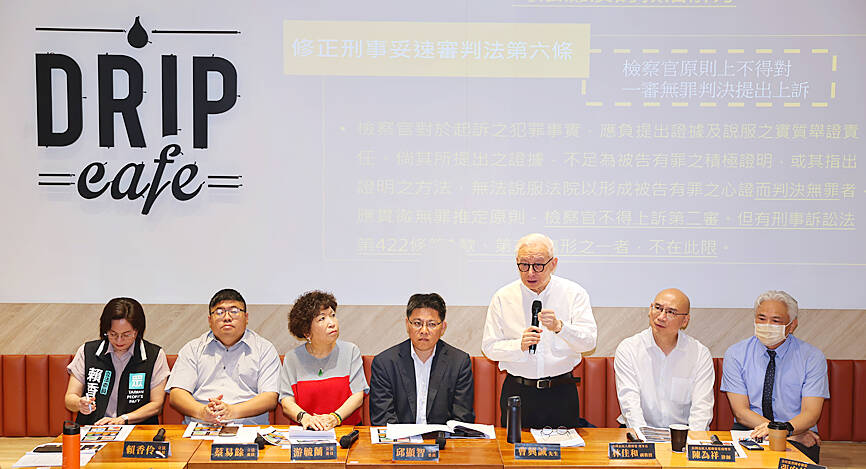United Microelectronics Corp founder Robert Tsao (曹興誠) yesterday called for “emergency bypass surgery” on the justice system by enhancing the role of police investigators to help prosecutors clear a backlog of cases.
Joined by legal experts and lawmakers at a news conference at the Legislative Yuan in Taipei, Tsao said that inefficiencies and outdated protocols had left the justice system in “paralysis.”
Comparing it to a coronary incident, he said it had clogged blood vessels and was headed for a heart attack.

Photo: CNA
“We must perform an emergency bypass surgery right now,” he said.
Police should be responsible for investigating petty crimes, before transferring them to prosecutors to “share the work burden and spur on cooperation,” while preventing the two sides from wasting time doing the same job, he said.
“It would also more reasonably and equitably divide our precious judicial resources, leading to improved efficiency for criminal investigations,” Tsao said.
In March, he launched the Taiwan Civil Liberties Union to advocate for judicial reforms, including expediting the legal process.
The intent of the Criminal Speedy Trial Act (刑事妥速審判法), which went into effect in 2019, is to prevent prosecutors from appealing a first ruling without good reason or sufficient new evidence, he said.
The current system allows prosecutors to file an appeal without due cause, which has resulted in delays and inefficiencies, leading to cases clogging up the courts, he said, adding that it also further harms the reputations of people who are later found not guilty in criminal matters.
“A justice system in paralysis cannot uphold justice for citizens,” Tsao said.
Taiwanese expect the Judicial Yuan and Executive Yuan to reform the legal system, “but the real battle is in the Legislative Yuan, for legislators to propose and approve amendments that improve the law and are in line with advances in society,” he said.
“In the past under one-party authoritarian rule, Taiwanese could only hope for a benevolent leader to grant them favors, to foster change. Now we are a democracy where the sovereignty and power are held by the citizens, so we should take up that responsibility to demand change, and unify our efforts to push for judicial reform,” he said.
Last year, prosecutors filed about 160,000 cases with charges that would carry minimum prison sentences of five years or less, Taiwan Jury Association director Chen Wei-shyang (陳為祥) said.
That made up about 65 percent of the total number of indicted suspects, many for petty crimes and not severe offenses, Chen said.
The police should have handled the investigating and evidence-gathering for these cases, he said.
“Public prosecutors had 750,000 cases last year, while we have fewer than 800 prosecutors. Each one has to address about 937 cases each year. They are overburdened and cannot do a thorough job for most cases,” he said.
Democratic Progressive Party Legislator Tsai Yi-yu (蔡易餘) said that civil groups and judicial reform advocates recommend that police investigators handle defamation, public insult, theft and other petty cases.
As police officers have close contact with local communities, they are more likely to fairly and reasonably investigate such matters, and then prosecutors can review the cases to determine whether to pursue indictments, Tsai said.

Beijing could eventually see a full amphibious invasion of Taiwan as the only "prudent" way to bring about unification, the US Department of Defense said in a newly released annual report to Congress. The Pentagon's "Annual Report to Congress: Military and Security Developments Involving the People's Republic of China 2025," was in many ways similar to last year’s report but reorganized the analysis of the options China has to take over Taiwan. Generally, according to the report, Chinese leaders view the People's Liberation Army's (PLA) capabilities for a Taiwan campaign as improving, but they remain uncertain about its readiness to successfully seize

Taiwan is getting a day off on Christmas for the first time in 25 years. The change comes after opposition parties passed a law earlier this year to add or restore five public holidays, including Constitution Day, which falls on today, Dec. 25. The day marks the 1947 adoption of the constitution of the Republic of China, as the government in Taipei is formally known. Back then the Chinese Nationalist Party (KMT) governed China from Nanjing. When the KMT, now an opposition party in Taiwan, passed the legislation on holidays, it said that they would help “commemorate the history of national development.” That

Taiwan has overtaken South Korea this year in per capita income for the first time in 23 years, IMF data showed. Per capita income is a nation’s GDP divided by the total population, used to compare average wealth levels across countries. Taiwan also beat Japan this year on per capita income, after surpassing it for the first time last year, US magazine Newsweek reported yesterday. Across Asia, Taiwan ranked fourth for per capita income at US$37,827 this year due to sustained economic growth, the report said. In the top three spots were Singapore, Macau and Hong Kong, it said. South

Snow fell on Yushan (Jade Mountain, 玉山) yesterday morning as a continental cold air mass sent temperatures below freezing on Taiwan’s tallest peak, the Central Weather Administration (CWA) said. Snowflakes were seen on Yushan’s north peak from 6:28am to 6:38am, but they did not fully cover the ground and no accumulation was recorded, the CWA said. As of 7:42am, the lowest temperature recorded across Taiwan was minus-5.5°C at Yushan’s Fengkou observatory and minus-4.7°C at the Yushan observatory, CWA data showed. On Hehuanshan (合歡山) in Nantou County, a low of 1.3°C was recorded at 6:39pm, when ice pellets fell at Songsyue Lodge (松雪樓), a